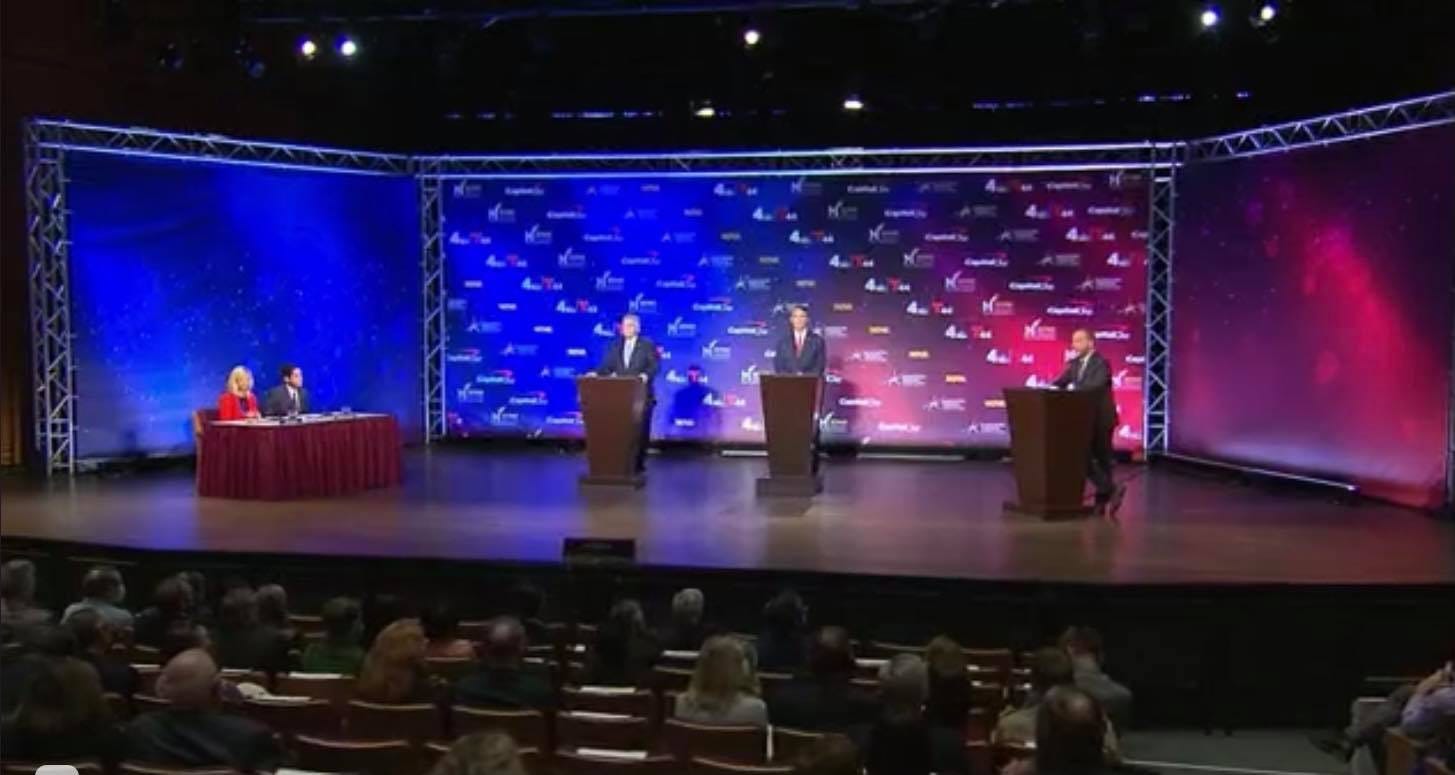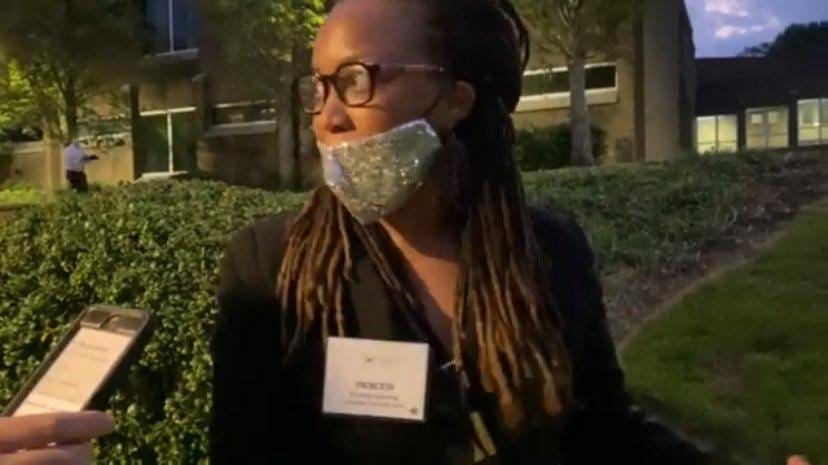This is a daily newsletter covering Virginia politics from top to bottom. Please consider supporting non-partisan, independent news by becoming a paid subscriber today.
McAuliffe stands behind policy reversals; Youngkin sticks with opposing vaccine mandates & says he would support Trump as GOP nominee in ’24
Terry McAuliffe (D) and Glenn Youngkin (R) met at Northern Virginia Community College Tuesday night for their second and final debate in the race to become the next governor of the commonwealth.
The night revealed very little new information about the candidates, however, with each one holding steady on their positions.
McAuliffe stood by his recent policy shift on qualified immunity for law enforcement, a law protecting them from civil lawsuits while on the job. McAuliffe said he continues to support the law at the debate Tuesday after indicating during the primary campaign that he would support erasing it. He did not directly answer questions as to why he flipped on this issue.
Youngkin has opposed repealing qualified immunity since his campaign began. Virginia’s Fraternal Order of Police endorsed him earlier in the day on Tuesday.
Youngkin stood by his position of opposing mandates for the COVID-19 vaccine Tuesday night. He urged people to receive the vaccine but wants them to do it on their own, not because of a mandate. He was also stumped briefly by a question asking if he supports mandating vaccines for measles, mumps, and rubella. “Data associated with those vaccines is something that we should absolutely understand the difference between this vaccine,” Youngkin responded at first, before being pushed to answer the question directly. “Those vaccines can be mandatory. I do believe the COVID vaccine is one that everyone should get, but we shouldn’t mandate it.”
Youngkin’s campaign confirmed after the debate that he supports mandatory vaccinations for measles, mumps, and rubella.
McAuliffe has called for vaccine requirements in most settings and professions across Virginia.
On ‘right to work’ laws, McAuliffe also made a reversal on this issue compared to his comments during the primary race. “Right to work is not going to change in Virginia,” McAuliffe said during the debate, noting he wants to focus on things that would actually pass in the General Assembly.
He cites the 83-13 vote in the House of Delegates earlier this year that killed the legislation that would have repealed ‘right to work’ laws. Since that vote, powerful House Democrat and Finance Chair Luke Torian declared his support for repealing the law that makes it difficult for unions to have any power in Virginia.
Both candidates agreed that decisions on transgender policies should be made at the local level. McAuliffe said the state will always provide guidance.
Youngkin’s campaign declared victory after the debate in a statement. “Undefeated debate champion Glenn Youngkin put on a display and ran circles around a 43-year politician Terry McAuliffe, who has spent more time inside a debate hall than he has on a manufacturing floor or in a boardroom working to create jobs,” said Mark Campbell, Youngkin’s campaign manager.
“There was only one person on the debate stage tonight with the plans to keep Virginians healthy and safe, keep our kids in school, and keep our economy strong: Terry McAuliffe,” said Democratic Party of Virginia Chairwoman Susan Swecker.
McAuliffe also released a new TV ad moments after the candidates walked off the state highlighting Youngkin’s stance on the Covid-19 vaccine.
Polling in the race has shown a tight race for weeks. A new poll from Monmouth University Monday showed McAuliffe with a 5-point lead among registered voters in Virginia.
The national election analysts at Cook Political Report changed their rating for this to a toss-up last week, possibly waking up content Democrats that believed Virginia had become a safe blue commonwealth. “To borrow from Mark Twain, the reports of the end of Virginia’s status as a swing state are greatly exaggerated,” said Stephen J. Farnsworth, professor of political science at the University of Mary Washington.
The candidates have until Nov. 2 to convince Virginia voters to show up for them at the polls.
All three gubernatorial candidates were at the debate — briefly.
The three gubernatorial candidates were in Northern Virginia Tuesday night at the gubernatorial debate — only two of them were on the debate stage, however, while the third was removed from the auditorium for interrupting the debate shortly after it began.
Princess Blanding, the Liberation nominee that is on the ballot this November stood up during the debate and began speaking loudly enough that the moderator stopped the debate and it went to commercial break.
“I made it very clear that I am a candidate to let Virginians know that their censorship of my candidacy is racist, it is very sexist, it is very oppressive, it is a form of voter suppression — their goal is to make sure that Virginians don’t know that I exist so they have to choose between the lesser of two evils,” Blanding said after being removed from the debate auditorium.
”They will not allow me to participate in the debates, I made it on the ballot,” Blanding continued. “They have an already-made base, I had to work 10 times harder to get on that ballot just to be told that I am not allowed to debate, I have to come and sit in the audience. I mean that is a bunch of bullshit. That is exactly what it is.”
Blanding told reporters outside of the event that this is the only way she can get media attention for her gubernatorial campaign. “Every time I do an interview, most of the press does not even air it or they will misquote me,” Blanding said. “So guess what, I refuse to play by the rules of the duopoly.”
Blanding, a public school educator, is running against the Republican nominee Glenn Youngkin, a former finance executive worth around half a billion dollars, and the Democratic nominee Terry McAuliffe, a party insider who has already been elected governor once.
In the only polling that included the third-party candidate, Blanding received 2% of the support.
She is also at a huge money disadvantage having raised only $21,856 compared to McAuliffe’s $31,833,505 and Youngkin’s $35,304,497, $16,500,000 of which he loaned to himself. “We have been told to trust the system and the system is made to keep third-party candidates oppressed,” Blanding said Tuesday.
More debate coverage:
McAuliffe, Youngkin lock horns one last time before Election Day
Third-party Virginia candidate disrupts McAuliffe-Youngkin debate
Terry McAuliffe says $3.5T reconciliation price tag is 'too high'
Trump looms large as Youngkin, McAuliffe trade barbs in final Va. governor debate
Columnist earned over $260k from Dominion while writing newspaper editorials about them - VPM News
by Ben Paviour
Dominion Energy paid Hampton Roads newspaper columnist Gordon Morse over $60,000 per year as he wrote unsigned editorials praising the utility, according to new paperwork filed by Dominion.
The company also paid over $20,000 to Larry Sabato, head of the University of Virginia’s Center for Politics, from 2017 to 2020 for an annual speech he has given to Dominion executives for three decades. Sabato’s staff say those earnings were donated to the university.
We are so thankful for the support we have received, but we still need more help. A donation, a paid-subscription upgrade to our newsletter, or a sponsorship purchase provides immediate funding and allows Virginia Scope to continue to grow and cover more stories across Virginia.


Today’s newsletter is sponsored by ComFor Care of Northwest Richmond
More Virginia political news
‘Opportunity for fraud’: Virginia GOP officials split from Youngkin on early voting integrity
Governor’s High School Voter Registration Challenge starts Tuesday
VEC heeds warning, delays new IT system until November for testing
Pipeline supporters outnumber opponents at DEQ public hearing
National News
As Trump hints at comeback, democracy advocates fear a ‘worst-case scenario’
Democrats search for sweet spot below $3.5 trillion price tag
From ‘sizzling to ho-hum’: Delta cools California’s economic outlook
GOP could split Colorado’s House seats under new congressional map
U.S. declares 23 species extinct, underscoring what scientists say is an acceleration of extinction
Fumio Kishida set to become Japan’s new prime minister after winning party vote
Beijing’s handling of Evergrande’s impending collapse puts a halt to China’s housing boom






